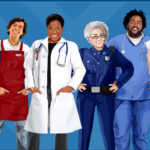Search
211 A Nexus for Needs Assistance
August 23, 2022
By Kelly Batson
UWBA Chief Community Impact Officer
3 minute read
How the UWBA Helpline Became the Bay Area Resource Hub
211 is a free, easy-to-remember phone number that connects callers with needed health and human services in their community. This help line is available in over 150 languages, 24 hours a day, 7 days a week, and serves the Bay Area the Marin, Napa, San Francisco, San Mateo, Santa Clara, and Solano counties.
A No Brainer!
While there are 211s all over the country, the first 211 in the United States launched in 1997, a joint effort of United Way Worldwide (formerly United Way of America)and the Alliance for Information and Referral Systems (AIRS)in Atlanta, GA. Three years later, the Federal Communications Commission(FCC) authorized the 3-digit dialing code “2-1-1” for helplines nationwide, allowing each state began to implement a process for designating the 211 code to operators locally.
For us in California, that process began in 2003 through the California Public Utilities Commission (CPUC). Because United Way Bay Area (UWBA)had been operating a helpline for the Bay Area region since 1977, applying to be our county’s 211 operator was a no-brainer! Doing so in our region would allow us to leverage the expertise we had developed as a community resource hub. Accessing and navigating resources is challenging for everyone but giving people an easy-to-remember number removes one significant barrier to the access side of the equation–we help with the navigation.
Navigating the System
Since our first San Francisco Countydesignationin 2004, we have answered over 700,000 calls, referring those callers to more than a million local services and programs. Needed services have ranged from emergency shelters, rent assistance, and food pantries, to free tax preparation assistance and mental health counseling.
211 Resource Specialists can assess a person multiple needs, often addressing a need the caller wasn’t intending to ask 211 about, and often in a single call. Our Resource Specialistsaretrained to ask that “second question” and truly listen to everything the caller shares. With a database of more than 3,000 agencies and programs, our staff can refer a caller to multiple local services for assistance with several needs at once.
A Vital Resource
Over the years, 211 has been a vital resource when our communities experience natural disasters like wildfires, floods, and earthquakes. In real-time, we can provide information on evacuation warnings, emergency shelters, and other long term recovery
services. The pandemic was no different. When our communities were in crisis, with their individual and public health impacted, and facing economic fallout, we manned the helpline, answering close to 50,000 calls and texts for COVID-related information and resources to date.
As you might know, the number of our community members experiencing homelessness across the Bay Area has skyrocketed as the housing crisis worsens. Throughout the pandemic, over 10,000 people looking for emergency shelter reached out to 211. Many of these callers were navigating the system for the first time.
Last summer, a 33-year-old called 211 to find a shelter closer to his job. The caller works for a company that provides him a company vehicle, and he was caught sleeping in the company-provided truck by his supervisor that morning. For this caller to get to his job, he needed a shelter in the peninsula. The Resource Specialist spent almost an hour on the phone with this caller assessing his needs and finding the right resources. The Resource Specialist also did a follow-up call to ensure the caller was able to get into a shelter.
The First Call
As we move into a new phase of the pandemic and the UWBA’snext Century of Impact, we are reimagining how211 can be more strongly rooted in equity and justice and support our most marginalized communities here in the Bay Area. This includes:
- Developing authentic partnerships with community-based organizations, community residents with lived experience, local services, and institutions to redesign the Information and Referral system
- Building on our commitment to have an up-to-date, accurate, and complete database of services and resources through collaboration with the service providers in our region
- Ensuring information about local services and systems are accessible through multiple channels: like web, text, chat, or a phone call with a real human
- Working closely with public health and emergency services organizations across our counties to ensure we can effectively respond to local and regional disasters
When we redesign the system with our community at the center, 211 will be the first call, not the last, when someone is looking for help. And the organizations that are providing daily services to our neighbors -families, children, seniors, and students -will be able to redirect their energy and resources upstream to collaboratively address root causes. You can be part of redesigning a system from the community up by supporting 211; we need everyone, and your involvement makes all the difference.



